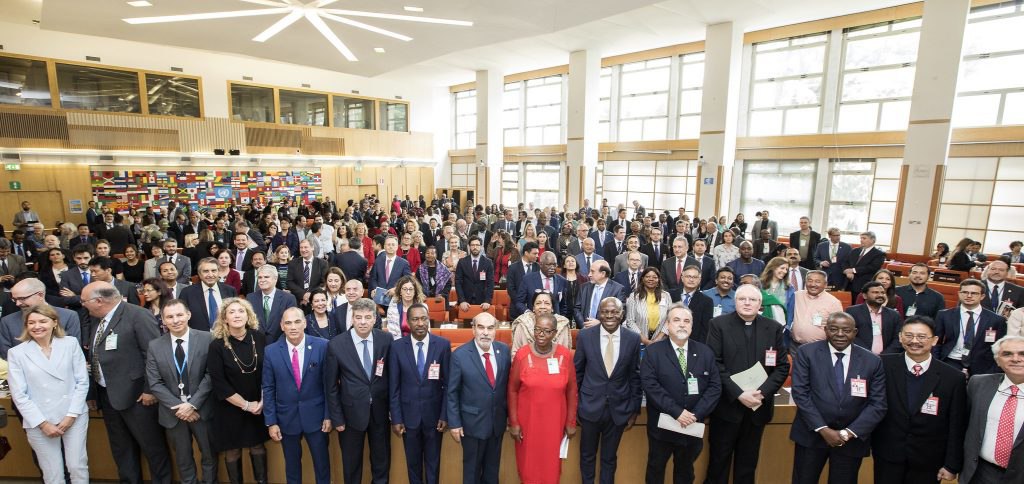In December 2017, the UN General Assembly declared 2019-2028 as the “United Nations Decade of Family Farming” and mandated the UN Food and Agriculture Organization (FAO) and the International Fund for Agricultural Development (IFAD) to implement the Decade. The resolution of the General Assembly also called on governments, international organizations and civil society organizations to contribute to the implementation of the decade.
The goals announced for the Decade are based on a global action plan with 7 pillars:
- Pillar 1. Develop an enabling policy environment to strengthen family farming.
- Pillar 2 – Transversal. Support youth and ensure the generational sustainability of family farming.
- Pillar 3, – Transversal. Promote gender equity in family farming and the leadership role of rural women.
- Pillar 4 – Strengthen family farmers’ organizations and capacities to generate knowledge, represent farmers and provide inclusive services in the urban-rural continuum.
- Pillar 5 – Improve socio-economic inclusion resilience and well-being of family farmers, rural households and communities.
- Pillar 6. Promote sustainability of family farming for climate-resilient food systems.
- Pillar 7. Strengthen the multidimensionality of family farming to promote social innovations contributing to territorial sustainability and food systems that safeguard biodiversity, the environment and culture.
The Decade was officially launched at FAO headquarters in Rome on 29th May 2019 and was preceded by sessions to exchange and discuss the priorities to implement the global action plan, with the participation of key stakeholders, including the International Planning Committee for Food Sovereignty and La Via Campesina.
La Via Campesina, with a strong delegation of representatives from several regions around the world, different agricultural activities and battlefields for agroecology and food sovereignty, had an active participation in the dialogues and shared its expectations, hopes and concerns with regards to the Decade. Will this Decade simply be another declaration of intent, adding to other ineffective instruments? How is family farming defined? What is the role to be played by governments? And where is the place for peasant agroecology?
The answers to these questions will be determining for the success of the Decade.
Elizabeth Mpofu, General Coordinator of La Via Campesina, gave the following address before the government representatives at the launch of the Decade:
“Right now, while we are sitting here, climate change and agribusiness are threatening us; hunger is increasing around the world and peasants commit suicide every day. We must move into action. It is time to implement solutions. We, the peasants, have these solutions and we have been explaining them for many centuries. The solution is to promote peasant family farming based on agroecology and food sovereignty, including small-scale food producers.”
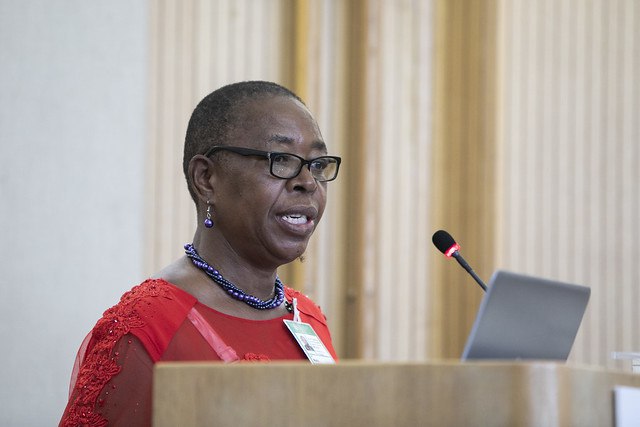
“Let us make from this Decade an opportunity for the implementation of the recently approved UN Declaration on the Rights of Peasants and other People Working in Rural Areas. We need to translate what is written on paper into public policies. We produce 80% of the world’s food. We need policies that are coherent at all levels. I therefore would like to invite you to dialogue with peasants, not just here in Rome, but at a national and regional level too.”
“We all know that, without us, there can be no Decade of Family Farming; no solutions and no Sustainable Development Goals to be met. I call on you to take responsibility and to adopt concrete measures, and to dedicate efforts and resources for this Decade to be a success. This Decade will only be successful if the voices of peasants are heard. This is only possible with deep structural transformations, including a transition towards agroecology and a true agrarian reform, defending, protecting and keeping territories under the control of peasants.”
Family farming has a name and surname
Many of the discussions during the launch had to do with how family farming is defined. It’s not only a question of semantics. Interpretations that obey private interests render the concept useless as well as the Decade’s objectives; besides further increasing the food crisis and poverty.
Pancha Rodriguez, a member of the National Association of Rural and Indigenous Women of Chile and a delegate of La Via Campesina at the launch of the Decade made the following statement:
“For us, the Decade comes with some challenges. Firstly, the definition of family farming. For us, family farming has a name and a surname; we talk of peasant agriculture; we talk of agriculture that has been developed by indigenous peoples; we refer to an agriculture that feeds the peoples. It is not about agriculture practiced by families that have a registered trademark and that are part of the exports agribusiness that appropriate rights on our seeds, our way of producing or consuming using misleading propaganda. Supporting this Decade of family farming is intricately linked to a fight for the rights of peasants and food sovereignty in our countries, our regions, our continents and globally. It’s the only way to ensure a good and healthy life for our peoples.”
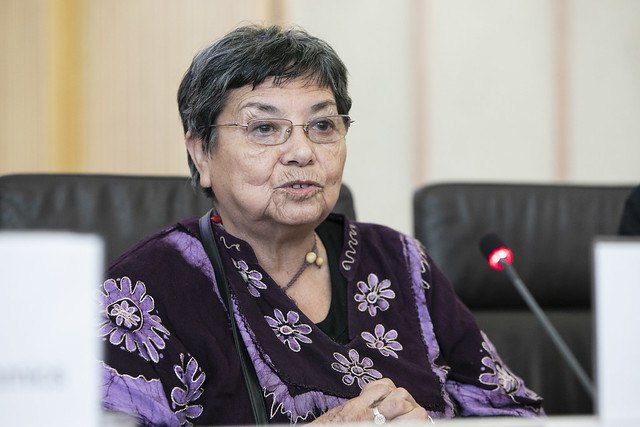
Agriculture means much more than just a daily activity. It carries values, a culture, feeling love for our earth and life and, more importantly, taking pride in what we do. Today, we are threatened by transnational corporations that have found the means to act on our food system. We have taken action, and that is why we proclaim food sovereignty as a right of the peoples. We have also made very strong, clear and precise proposals so that people understand that, today, not only peasants are at risk of disappearing, but that peoples are at risk of becoming subordinate and living in slavery by being forced into a large market of cheap labour. We refer to peasants’ rights to ensure healthy diets, to keep our land alive and with diversity, to conserve our earth, the source of wealth. Above all, we want to protect life. And food is life, as long as it is produced using the forms of traditional agriculture that have been practised for millennia by indigenous peoples. This is why, for us, family farming is peasant and indigenous agriculture; it is practised by families, true, but in connection to the community, with workers united to build the future.
Pancha Rodriguez, ANAMURI, Chile, La Via Campesina
Family farming (which we must remember is peasant and indigenous) is conserved through spaces of peaceful rural governance, to safeguard biodiversity, our climate, our human rights and rural knowledge and livelihoods. This governance means we need public policies that guarantee access to education, health, work means, local markets and distribution. It must come with decent living wages for workers so they can buy what they need. However, until this day, the agribusiness pays pitiful wages, denies access to health and social security, poisons water and air with toxic products and practice a type of agriculture that transforms nature into waste. These two forms of agricultural production cannot end up included under the same definition, and an action plan cannot serve both of them.
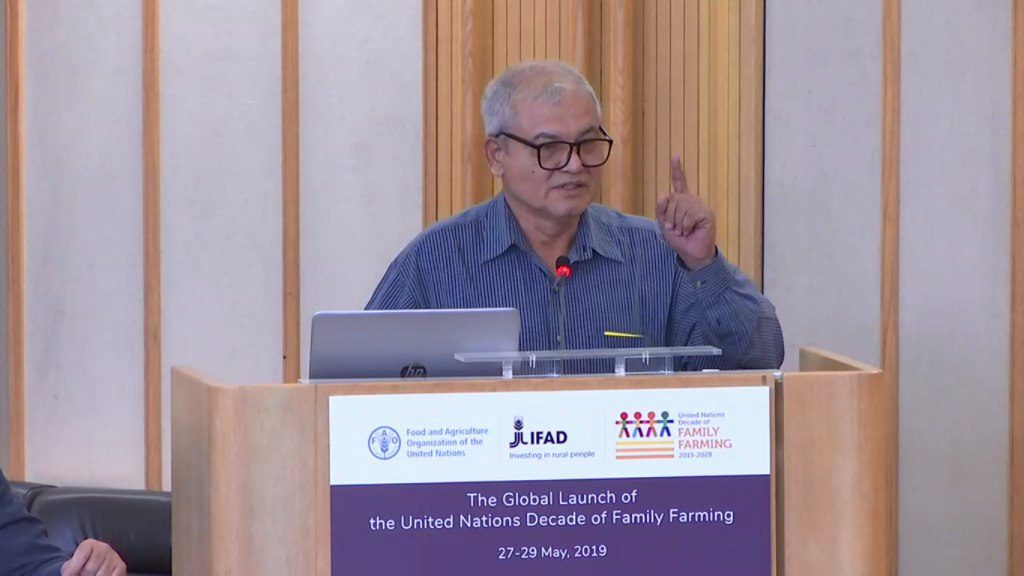
Edgardo Garcia, a member of the Nicaragua Land Workers’ Association, and a delegate of La Via Campesina at the launch of the Decade for Family Farming, explains the abysmal gap between these two modes of producing and thinking about food:
“Industrial agriculture is part of a system that encourages the drivers behind wasting products, the grabbing of resources and the exploitation of workers. According to this system, if you waste products, you live in happiness, but if you produce quality products, you’ve failed as an individual. It’s about extortion and taking pleasure in exploitation. It’s a battle between two separate worlds of ideas, values and culture. The satisfaction offered by peasant and indigenous agriculture comes through the realisation of our rights, living in harmony with our earth and our communities. If we translate this into the context of the Decade, on the one hand we have the paradigms of the IMF, the WTO and the organisations and States representing the agribusiness, who all promote a free market for lands and people; with no social or economic subjects, only chains of buyers, supermarkets and huge amounts of waste. On the opposite side, La Via Campesina, fisher folk and indigenous communities have promoted peasant rights, voluntary guidelines, the human rights of migrant workers and frontier workers. We defend social security laws against grabbing; we promote respect for the Land that feeds us all. The Indigenous Peoples Convention and, now, the Decade of Family Farming. All of this is of paramount importance for the emancipation of peoples and their coexistence with nature. For us, the Decade is a space to promote the social change we have always demanded for peoples, workers and peasants.
Edgardo Garcia, ATC Nicaragua, La Via Campesina
Precisely, the Decade of Family Farming adds to a list of instruments in place: the Recommendations of the Committee of Food Security on connecting smallholders to markets, the 10 elements of agroecology, the Sustainable Development Goals, the Convention on Indigenous Peoples, etc. which are barely used to come up with concrete measures to revert hunger in the world and especially affecting rural environments.
The question that rises, which was mentioned by the delegates of La Via Campesina at the launch of the Decade, is how can a link be established to bring coherence between all these instruments to, once and for all, meet the reality: a vote in favour of a Declaration at an international assembly should not allow governments to abandon their responsibilities towards indigenous peoples, and these declarations are ineffective without coherent laws and public policies that remain in time when governments are replaced by transnational corporations.
Implementing the Decade of Family Farming through the Peasants’ Rights Declaration
The most recent win for the international peasants’ movement is the United Nations Declaration on the Rights of Peasants and other people working in rural areas, which was adopted on 17 December 2018.
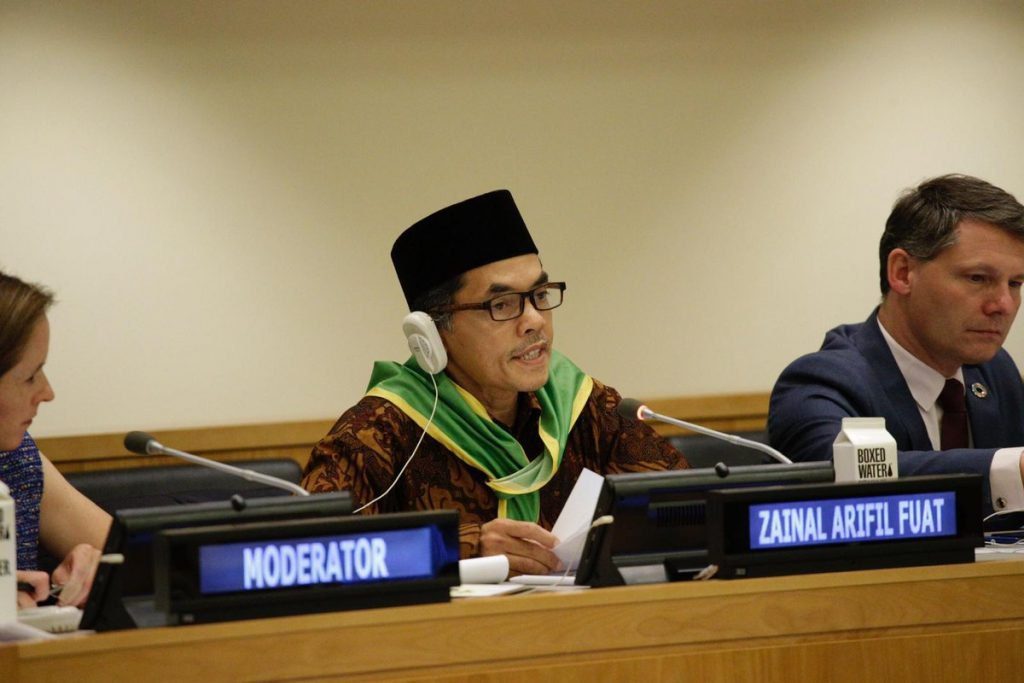
Zainal Arifin Fuat, member of the Indonesian Peasant Union and a delegate of La Via Campesina at the launch of the Decade, established a link between the decade and the peasants’ rights declaration:
“I am delighted at the launch of the United Nations Decade of Family Farming, which recognizes the existence of this agriculture and the role it plays in producing goods that feed the world. The Decade is a link towards the Peasants’ Rights Declaration, as it protects the rights of peasants to their land, their seeds, water, distribution and participation. These rights are enshrined in the seven pillars of the Decade’s global action plan and this means that the Peasants’ Rights Declaration can finally be implemented through the Decade. This will depend on the efforts made by governments, IFAD and FAO, and is necessary for the Decade to be a success. We have witnessed the failure of the Sustainable Development Goals, since its implementation is contrary to the interests of indigenous peoples and peasants and is not based on food sovereignty. This Decade brings a new opportunity to make the right choices, especially since millions of people suffer from hunger in rural areas.”
Zainal Arifin Fuat, Serikat Petani Indonesia, La Via Campesina
Edgardo Garcia adds: “For us, the Decade is a space to promote the social change we have always demanded for peoples, workers and peasants. If governments listen to these demands, peoples will have their rights guaranteed and will be able to produce. If they don’t, it’ll be clear that the governments, FAO and IFAD will place agribusiness at the centre of the Decade. The link between the Peasants’ Rights Declaration and the Decade must come from policies, consultations and recognition of organizations to implement the Decade. If we are not given the space we need, this will only benefit the agribusiness.
Our main responsibility as delegates of La Via Campesina is to clearly state our expectations in the framework of the Decade. Its success doesn’t only depend on us, also on the political will and resources made available by governments, as well as the support we receive from our people, the progressive forces, unions and political parties to lobby our governments to implement the Decade and the Declaration on the rights of peasants and other people working in rural areas.
All images by FAO/Giulio Napolitano.
This post is also available in Français.

